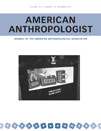
AMERICAN ANTHROPOLOGIST
Scope & Guideline
Fostering scholarly dialogue across cultures and disciplines.
Introduction
Aims and Scopes
- Cultural Anthropology:
The journal emphasizes cultural anthropology, exploring the intricacies of cultural practices, beliefs, and social structures across various communities worldwide. - Decolonization and Indigenous Studies:
There is a strong focus on decolonization, examining the impacts of colonialism on Indigenous peoples and advocating for Indigenous rights and knowledge systems. - Environmental and Political Anthropology:
Research often intersects with environmental issues and political dynamics, addressing how cultural practices relate to ecological challenges and governance. - Ethnographic Methods and Approaches:
The journal promotes diverse ethnographic methodologies, encouraging innovative approaches to fieldwork and participant observation in various contexts. - Social Justice and Activism:
A significant aim is to address social justice issues through anthropological insights, emphasizing activism and advocacy within and beyond academic circles. - Multispecies and More-than-Human Perspectives:
The journal increasingly incorporates multispecies perspectives, exploring the relationships between humans and non-human entities in anthropological research.
Trending and Emerging
- Decolonial Theory and Practice:
Recent publications increasingly emphasize decolonial frameworks, highlighting the need to challenge and rethink anthropological practices and knowledge production in relation to colonial histories. - Climate Change and Environmental Justice:
A notable surge in research addressing climate change impacts and environmental justice indicates a prioritization of ecological concerns and the social implications of environmental degradation. - Global Health and Pandemic Studies:
The journal has seen a rise in articles exploring the anthropological dimensions of global health crises, particularly in light of the COVID-19 pandemic, illustrating the intersection of health, culture, and society. - Digital Anthropology:
There is an emerging focus on digital anthropology, examining the implications of technology on social interactions, cultural practices, and identity formation in a rapidly digitizing world. - Multispecies Relations and Eco-Anthropology:
A growing interest in multispecies relations reflects a shift towards understanding human interactions with non-human entities, emphasizing the interconnectedness of all life forms.
Declining or Waning
- Traditional Archaeology:
There is a noticeable decline in papers solely focused on traditional archaeological methods and findings, as the journal shifts toward more contemporary and applied anthropological issues. - Historical Anthropology:
Research that strictly adheres to historical anthropology, without integrating present-day implications or connections, is becoming less frequent. - Biological Anthropology:
Papers centered solely on biological anthropology topics, such as human evolution or genetics, seem to be less represented in recent issues, indicating a broader focus on cultural and social dimensions. - Western-centric Perspectives:
There is a waning interest in anthropological analyses that are predominantly Western-centric, with a growing emphasis on non-Western voices and experiences. - Methodological Essentialism:
A decline in works that rely on rigid methodological frameworks without considering the fluid and dynamic nature of cultural practices is evident, as the field moves towards more integrative approaches.
Similar Journals

Boletin Antropologico
Exploring the Rich Tapestry of Latin American CulturesBoletin Antropologico, published by UNIV LOS ANDES, is a vital academic journal dedicated to the field of anthropology, focusing on the diverse cultural practices, social structures, and historical contexts of societies, particularly within Latin America. With its ISSN of 0257-750X, this journal aims to provide a platform for researchers and scholars to disseminate their findings and engage in meaningful discussions that advance the understanding of anthropological issues. Although Boletin Antropologico currently does not follow an open-access model, it remains a significant resource for professionals seeking peer-reviewed content that reflects rigorous academic standards. With a commitment to fostering intellectual growth and collaboration among anthropologists, the journal serves as an essential reference for students and practitioners keen on exploring the rich tapestry of human cultures and societies.
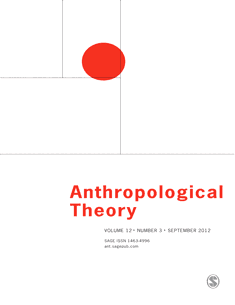
Anthropological Theory
Transforming Theories into Global InsightsAnthropological Theory, published by SAGE Publications Ltd, stands at the forefront of the field of anthropology, delivering cutting-edge research and critical analyses that shape contemporary understanding of human societies. With its ISSN 1463-4996 and E-ISSN 1741-2641, this distinguished journal boasts an impressive impact factor and has been recognized in the Q1 quartile category across both anthropology and arts and humanities disciplines, reflecting its high citation rates and scholarly influence. Covering a wide range of topics from cultural practices to social dynamics, Anthropological Theory serves as an essential resource for researchers, professionals, and students alike, fostering a rich dialogue within the academic community. The journal's continuous publication since 2001 ensures a dynamic platform for emerging theories and methodologies, providing invaluable insights for those engaged in anthropological discourse. Its recognition within the top percentile rankings of Scopus further underscores its significance and attractiveness to contributors seeking to disseminate their work on a global stage.

ZEITSCHRIFT FUR ETHNOLOGIE - Journal of Social and Cultural Anthropology
Advancing Insights in Social and Cultural AnthropologyZEITSCHRIFT FUR ETHNOLOGIE - Journal of Social and Cultural Anthropology, published by DIETRICH REIMER VERLAG, serves as a vital platform for the dissemination of high-quality research in the fields of social and cultural anthropology. Established with a commitment to advancing scholarly dialogue, this journal captures the dynamic interplay of cultural practices and social structures across diverse contexts. With an ISSN of 0044-2666, it gained significant traction among researchers, ranking in Q3 for Cultural Studies and Q4 for miscellaneous Social Sciences in 2023. Its Scopus ranking reflects its growing impact, particularly within the 68th percentile of Cultural Studies. Although the journal does not offer open access, it remains a crucial resource for academia, fostering critical insights and innovative analyses essential for students, professionals, and scholars alike. With a publication history highlighted by a convergence of issues from 1981 and various intervals, the journal is poised to shape debates in anthropological research both locally within Germany and globally.
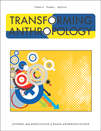
Transforming Anthropology
Elevating Anthropology through Pioneering ResearchTransforming Anthropology is a dynamic and influential journal in the field of Anthropology, published by Wiley. With an ISSN of 1051-0559 and an E-ISSN of 1548-7466, this journal has established a reputable position within academic circles, evidenced by its impressive Q2 rating in the 2023 category quartiles and a 77th percentile rank in the Scopus Ranks for Social Sciences. Since its inception, the journal has evolved to reflect contemporary anthropological discourse, addressing crucial issues from diverse perspectives. Although it does not currently operate under an Open Access model, its content remains accessible to a global readership eager to engage with pioneering research. Spanning converged years from 1990 to 1994 and 2010 to 2024, Transforming Anthropology serves as a vital platform for exploring transformative ideas and methodologies within the discipline. Researchers, professionals, and students alike can benefit from the scholarly contributions and insightful discussions fostered within its pages, making it an essential resource for anyone invested in the complexities of human culture and society.
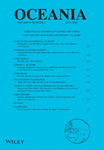
OCEANIA
Connecting Perspectives from the Pacific and BeyondOCEANIA, published by WILEY, is a distinguished journal that has been fostering scholarly discourse in the fields of anthropology and the history and philosophy of science since its inception in 1930. With an impressive impact factor and secure positions in the Q2 quartile for both categories, OCEANIA stands out as an influential resource for researchers and professionals alike. Its latest Scopus rankings reflect its commitment to quality, placing it in the 76th percentile for history and philosophy of science and the 66th percentile for anthropology. Though it does not operate under an open access model, the journal provides robust access options for institutions and individuals to explore its rich array of peer-reviewed articles that contribute to the understanding of cultures and scientific thought across the Pacific region and beyond. As we advance toward its continued convergence into 2024, OCEANIA remains a pivotal platform for innovative research and academic debate, cultivating insights that are crucial for scholars and students navigating the complexities of these interconnected disciplines.
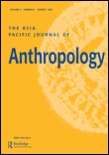
Asia Pacific Journal of Anthropology
Highlighting Innovative Research in the Asia Pacific RegionAsia Pacific Journal of Anthropology is a premier academic journal dedicated to advancing the field of anthropology and cultural studies, published by Routledge Journals, Taylor & Francis Ltd. With an ISSN of 1444-2213 and E-ISSN 1740-9314, this journal has gained recognition for its rigorous scholarly contributions since its inception in 2000. Situated in the UK, it is strategically positioned to serve as a vital resource for researchers, professionals, and students exploring the rich complexities of human societies and cultures within the Asia Pacific region and beyond. As evidenced by its Q2 ranking in both anthropology and cultural studies for 2023, alongside its impressive Scopus ranks—#218 among 1304 in Cultural Studies and #157 among 502 in Anthropology—this journal illustrates a strong commitment to delivering high-quality, impactful research. While it is not an open-access journal, it remains a key platform for disseminating innovative research and fostering academic dialogue, thereby significantly contributing to the advancement of knowledge in the social sciences.
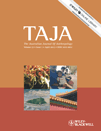
Australian Journal of Anthropology
Fostering Interdisciplinary Dialogue in AnthropologyThe Australian Journal of Anthropology, published by Wiley, stands as a pivotal resource in the field of anthropology, reflecting a deep commitment to advancing scholarly discourse since its inception in 1990. With an ISSN of 1035-8811 and E-ISSN 1757-6547, this journal provides a platform for innovative research and critical analysis, contributing to the global anthropology community. Based in the United States, at 111 River St, Hoboken, NJ, it has established itself in the Q3 category of anthropology journals, ranking #162 out of 502 in Scopus, placing it in the 67th percentile among its peers. While it is not currently an open-access publication, the journal remains dedicated to accessibility through institutional subscriptions and provides a wealth of insight into anthropological methods and cultural studies. It seeks to foster interdisciplinary dialogue and promote a comprehensive understanding of social dynamics, making it an essential read for researchers, professionals, and students eager to enrich their knowledge and engage with contemporary anthropological issues.

Annual Review of Anthropology
Shaping the Future of Anthropological DiscourseAnnual Review of Anthropology is a premier journal published by Annual Reviews, dedicated to providing comprehensive and authoritative reviews in the field of anthropology. Established with the goal of synthesizing essential research findings, this influential publication not only shapes contemporary anthropological discourse but also facilitates interdisciplinary dialogue within the broader realm of social sciences and cultural studies. With an impressive impact factor that places it in the Q1 category across multiple classifications, including Anthropology and Arts and Humanities, this journal is highly regarded by researchers and academics alike. The Annual Review of Anthropology has been a trusted resource for critical insights and transformative ideas, helping to advance the understanding of human societies from 1980 to the present. Although it does not offer open access, access to its articles is available through various academic institutions, ensuring that both seasoned scholars and students can benefit from its wealth of knowledge. With a Scopus ranking placing it in the top percentiles for relevant subjects, this journal is essential reading for anyone looking to stay at the forefront of anthropological research.

ANTHROPOS
Cultivating critical insights into complex cultural phenomena.ANTHROPOS is a distinguished journal published by NOMOS VERLAGSGESELLSCHAFT MBH & CO KG, anchoring its academic presence in Switzerland since its inception in 1983. With a commitment to advancing the fields of Anthropology and Arts and Humanities, this peer-reviewed publication serves as a vital platform for scholarly research, providing critical insights and fostering dialogue among researchers, professionals, and students alike. ANTHROPOS is categorized in Q3 for both Anthropology and the broader Arts and Humanities domains as of 2023, indicating its reputable yet emerging presence within these disciplines. Despite its significant contributions, the journal currently does not feature open access options, urging readers to engage through traditional academic channels. By embracing interdisciplinary approaches and contemporary issues, ANTHROPOS aims to illuminate complex cultural phenomena, making it an essential resource for anyone dedicated to understanding the intricacies of human societies.

DIALECTICAL ANTHROPOLOGY
Unraveling the Dynamics of Structure and AgencyDIALECTICAL ANTHROPOLOGY, published by SPRINGER, is a prestigious journal within the field of anthropology, recognized for its substantial contributions to dialectical and critical theory in social research. Since its inception in 1975, the journal has carved a niche by exploring the intersections of culture, society, and politics, making it an essential resource for scholars and practitioners. With an impact factor that places it in the Q2 category for both anthropology and arts and humanities, and significant rankings in sociology and political science, it reflects a solid scholarly reputation. The journal operates on a subscription basis, allowing for a wide dissemination of rigorous academic research without open access. With ISSN 0304-4092 and E-ISSN 1573-0786, DIALECTICAL ANTHROPOLOGY serves as a crucial platform for fostering dialogue and advancing knowledge in contemporary anthropology and related disciplines. As a researcher, professional, or student, engaging with the insights presented in this journal will deepen your understanding of the dynamic interplay between structural and agency-oriented perspectives in social contexts.